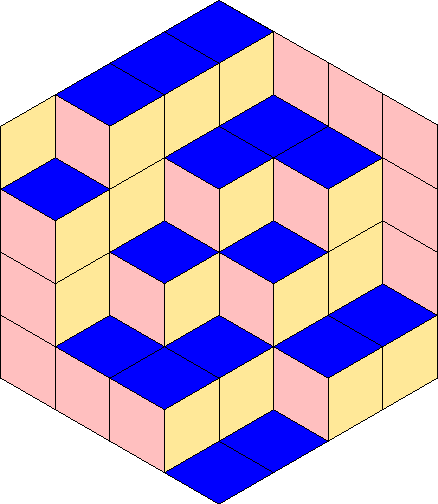The adjacency matrices of graphs form a special subset of the set of all integer symmetric matrices. The description of which graphs have all their eigenvalues in the interval (i.e. those having spectral radius at most 2) has been known for several decades. In 2007 we extended this classification to arbitrary integer symmetric matrices.
In this paper we turn our attention to symmetrizable matrices. We classify the connected nonsymmetric but symmetrizable matrices which have entries in that are maximal with respect to having all their eigenvalues in . This includes a spectral characterisation of the affine and finite Dynkin diagrams that are not simply laced (much as the graph result gives a spectral characterisation of the simply laced ones).
Accepted:
Revised after acceptance:
Published online:
Keywords: Symmetrizable matrices, spectral radius, Dynkin diagrams
McKee, James 1; Smyth, Chris 2
 CC-BY 4.0
CC-BY 4.0
@article{ALCO_2020__3_3_775_0,
author = {McKee, James and Smyth, Chris},
title = {Symmetrizable integer matrices having all their eigenvalues in the interval $[-2,2]$},
journal = {Algebraic Combinatorics},
pages = {775--789},
year = {2020},
publisher = {MathOA foundation},
volume = {3},
number = {3},
doi = {10.5802/alco.113},
language = {en},
url = {https://alco.centre-mersenne.org/articles/10.5802/alco.113/}
}
TY - JOUR AU - McKee, James AU - Smyth, Chris TI - Symmetrizable integer matrices having all their eigenvalues in the interval $[-2,2]$ JO - Algebraic Combinatorics PY - 2020 SP - 775 EP - 789 VL - 3 IS - 3 PB - MathOA foundation UR - https://alco.centre-mersenne.org/articles/10.5802/alco.113/ DO - 10.5802/alco.113 LA - en ID - ALCO_2020__3_3_775_0 ER -
%0 Journal Article %A McKee, James %A Smyth, Chris %T Symmetrizable integer matrices having all their eigenvalues in the interval $[-2,2]$ %J Algebraic Combinatorics %D 2020 %P 775-789 %V 3 %N 3 %I MathOA foundation %U https://alco.centre-mersenne.org/articles/10.5802/alco.113/ %R 10.5802/alco.113 %G en %F ALCO_2020__3_3_775_0
McKee, James; Smyth, Chris. Symmetrizable integer matrices having all their eigenvalues in the interval $[-2,2]$. Algebraic Combinatorics, Volume 3 (2020) no. 3, pp. 775-789. doi: 10.5802/alco.113
[1] Problems in present day mathematics, Mathematical developments arising from Hilbert problems. Proceedings of the symposium in pure mathematics of the American Mathematical Society, held at Northern Illinois University, DeKalb, Illinois, May 1974. (Proc. Symp. Pure Math.), Volume 28 (1976) p. 46, in Felix E. Browder: “Problems in present day mathematics”, Problem VIII. The A-D-E classifications (V. Arnold) | Zbl
[2] Lie algebras of finite and affine type, Cambridge Studies in Advanced Mathematics, 96, Cambridge University Press, Cambridge, 2005, xviii+632 pages | Zbl | MR | DOI
[3] A very short proof of Cauchy’s interlace theorem for eigenvalues of hermitian matrices, Amer. Math. Monthly, Volume 112 (2005) no. 2 (p. 118, see also https://arxiv.org/abs/math/0502408v1)
[4] Cyclotomic matrices over real quadratic integer rings, Linear Algebra Appl., Volume 437 (2012) no. 9, pp. 2252-2261 | Zbl | MR | DOI
[5] The ubiquity of Coxeter–Dynkin diagrams (an introduction to the A-D-E problem), Nieuw Arch. Wisk. (3), Volume 25 (1977) no. 3, pp. 257-307 | Zbl | MR
[6] The Cauchy interlace theorem for symmetrizable matrices (2016) (https://arxiv.org/abs/1603.04151)
[7] Integer symmetric matrices having all their eigenvalues in the interval , J. Algebra, Volume 317 (2007) no. 1, pp. 260-290 | Zbl | MR | DOI
[8] Symmetrizable matrices, quotients, and the trace problem (2020) (in preparation) | Zbl
[9] Some properties of the spectrum of a graph, Combinatorial Structures and their Applications (Proc. Calgary Internat. Conf., Calgary, Alta., 1969) (1970), pp. 403-406 | Zbl | MR
[10] Lie Algebras, 2004 (Harvard University, http://people.math.harvard.edu/~shlomo/docs/lie_algebras.pdf)
Cited by Sources:

